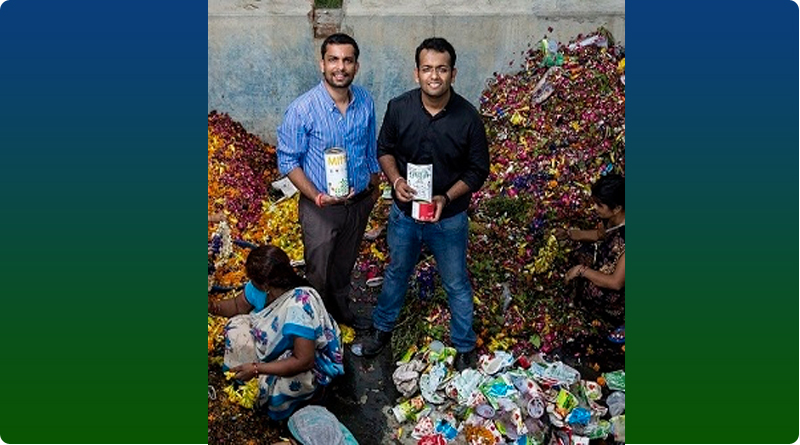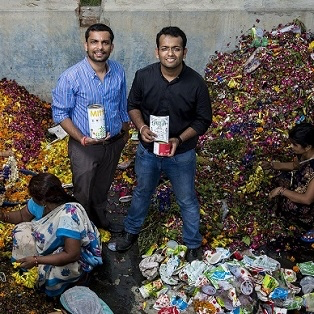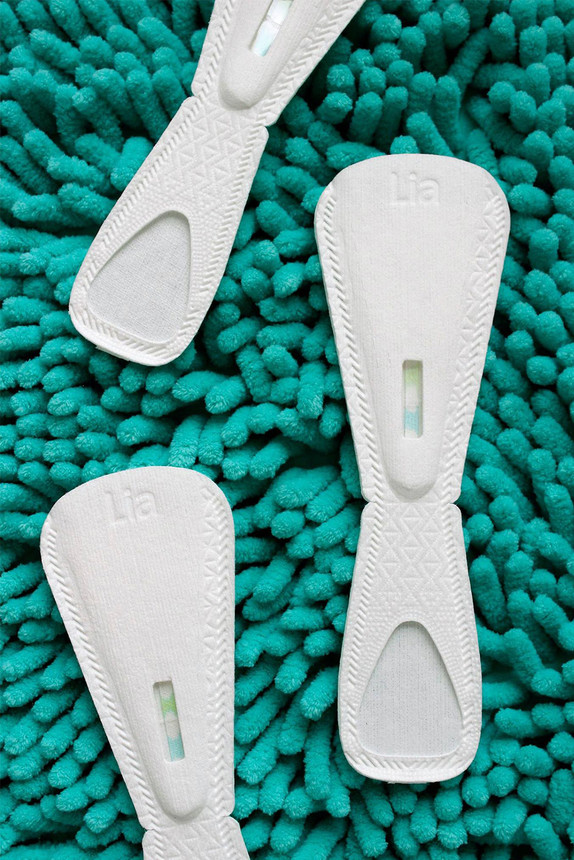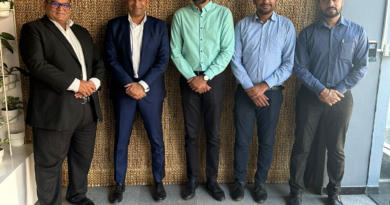Ideas Set To Change the World: Part I

Published on: Apr 11, 2018
The World Changing Ideas Awards started in 2017, celebrates businesses, policies and non-profits from around the world that help shift society to a more sustainable future. This year the winners were picked from 240 finalists and a pool of 1400 entries. This two part series at Iamrenew follows the stories of four winners of the 2018 World Changing Ideas Awards whose ideas are set to have a positive impact on the environment and society.
HelpUsGreen, Kanpur Flowercycling
(Winner for Consumer Product Category)

HelpUsGreen has been on a mission to preserve the river Ganga since its inception in the year 2015. It is estimated that a total of 8000 tonnes of waste flowers get dumped in the Ganga every year. These flowers tend to release arsenic, lead, cadmium and harmful pesticides making the water highly poisonous by increasing its Ph level to approximately 6-8.5. These pollutants are estimated to affect over 400 million lives, leading to dysentery, cholera and severe diarrhea.
HelpUsGreen collects floral waster from temples and mosques in Uttar Pradesh and prevents 7600kgs of flowers and 97kgs of toxic chemicals from getting into the river on a daily basis. The waste collected is then handcrafted into organic fertilizers and incense sticks by the 1200 rural women employed by the company, many of whom did not have formal employment before and have since been empowered.
The company’s founders Ankit Agarwal and Karan Rastogi met each other at a coaching class in Kanpur. Ankit studied engineering and pursued his master’s in Innovation Management from Symbiosis Institute of Business Management, Pune. He then worked at Symantec Corporation for three years before returning to Kanpur. He has published 13 research papers in various international journals and some of his work is being reviewed at patent offices. Karan pursued his master’s in Business Analytics and Consulting from Warwick School of Business, he based his thesis on climate change and carbon credits.
Both the friends started researching the best ways to decompose flowers and found the perfect solution by mixing 17 natural ingredients with the help of earthworms. This vermicompost mixture uses coffee residue as one of its ingredients, which is collected from coffee shops across Kanpur and is named Mitti.
They later came up with “sticks and stones” their range of incense sticks made using flowers as opposed to carcinogenic coal. These sticks are hand rolled and dipped in essential oils.
Even the packaging they use for their products is made of seed paper (paper with seeds interspersed in it) this packing can be sown in the ground.
The duo are currently researching ways to best recycle flowers to obtain 100% synthetic free, vegan soaps and how to make organic Styrofoam from these waste flowers. They aim to spread their operations across 2000 Km along the banks of Ganga and provide employment to 25000 women and contribute to educating the their children.
(Winner for the Health Category)

The pregnancy test industry hasn’t seen any innovation in the last 30 years with the sole exception of adding a digital component to it. An estimated 2 million pounds of pregnancy tests wind up in landfills each year all around the world. These tests used for merely a few minutes end up having a lasting impact on the environment. The Lia pregnancy test is the first of its kind pregnancy test, which is flushable or fully biodegradable. This test offers a sustainable alternative to the conventional tests; it also allows women to completely dispose off their tests thereby keeping their results absolutely private.
Based in Philadelphia, the company is funded by seed funding from DreamIt Ventures, Ben Franklin Technology Partners and other angel investors. Its founders, Bethany Edwards and Anna Simpson founded the company in 2015 based on a project that Edwards and two other classmates embarked on at the University of Pennsylvania’s integrated product design program. Edwards was interested in innovations in material science, specifically creating products that match their lifestyle. She wanted to redesign single-use diagnostics and make them more sustainable, she specifically chose pregnancy tests as it the technology hasn’t been changed since 1987.
The test itself works the same way a normal pregnancy test would work and has been proven to produce results with a 99% accuracy rate. The test checks for the hCG hormone (Human Chronic Gonadotropin) in the urine. The body tends to produce the hormone rapidly during pregnancy and is hence a reliable indicator for determining weather the person is pregnant or not. One line indicates the result is negative and double lines indicate a positive result.
The test is made up of the same natural plant fibers used for making most toilet papers and is 100% biodegradable; the special perforations in the test help it to break down easily while flushing or composting. Lia uses a propriety coating that repels water long enough to take the test.
The company has patented the technology around the tests including a patent for both design and utility and is awaiting several other patents. Lia received its FDA approval last December and is on track to start selling its products in stores and on Amazon this summer. The prices range from $9-$22. Visitors on Lia’s site can also donate a test for $10 to one of its partner organisations, like Planned Parenthood Global. The company further plans on expanding into making sustainable and eco-friendly home diagnostic tests for ovulation and UTIs (Urinary Tract Infections).
![]()




